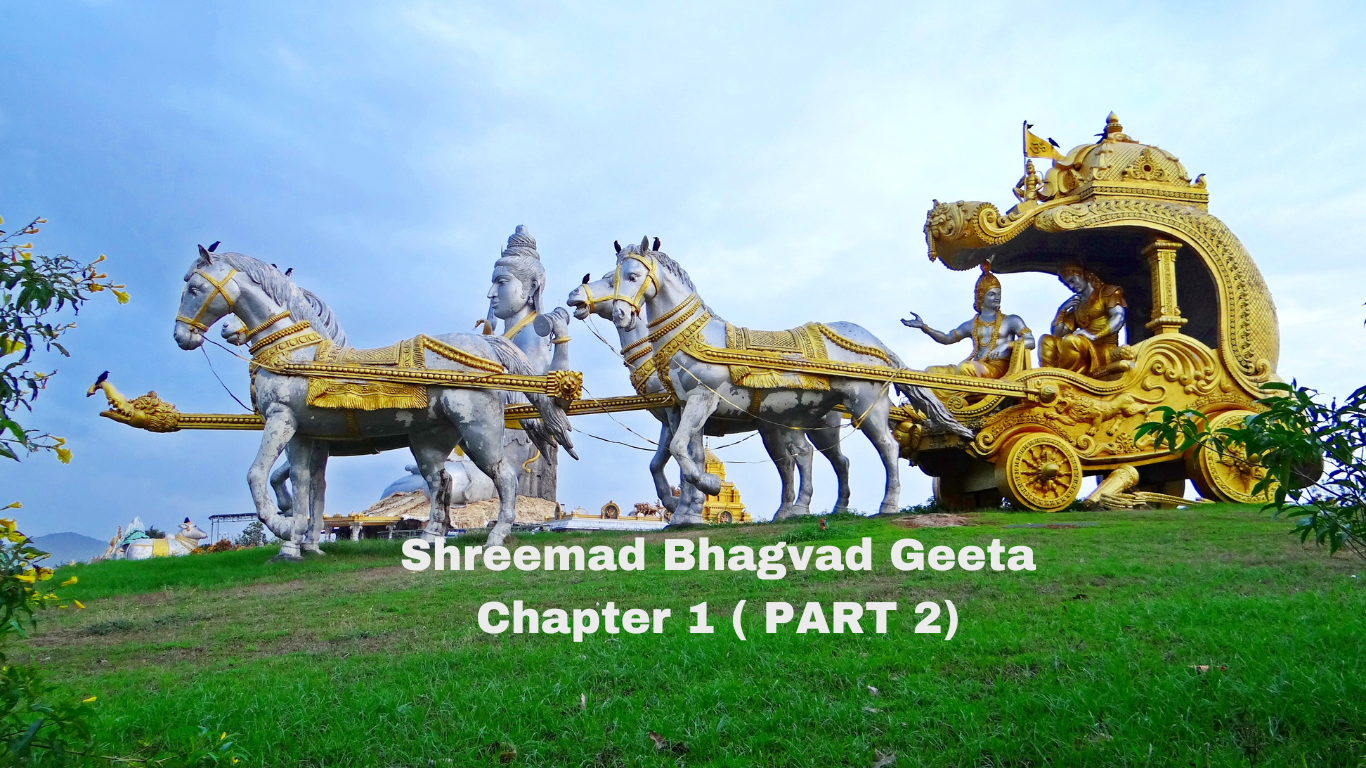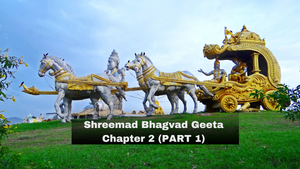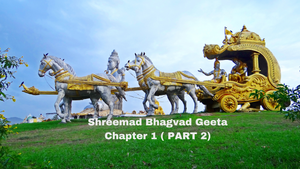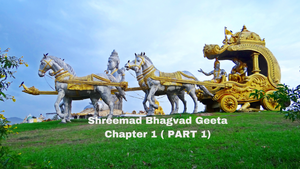
How Does Our Grief Serves Us?
Do you know that number 18 has a great significance in our culture. There are 18 Chapters of Shreemad Bhagvad Geeta, 18 Chapters in Mahabharata, the Battle of Mahabhartha also went on for 18 days, and the total Akshoni sena was also 18.
Now, let’s understand the rest of the verses from Chapter 1 of Shreemad Bhagvad Geeta.
Chapter 1 of Shreemad Bhagvad Geeta Continued
In the last few verses of Chapter 1, we saw that Arjuna is totally deviated from his purpose. He forgets all their hard work where they had to live in the forest for 12 years and in an unknown residence (Agyaatvaas) where nobody could find them for 1 year. In his unconsciousness, he has totally forgotten that Mahabharata was a battle between Dharma and Adharma, all due to his overwhelmed emotions.
28th and 29th Verse
Soon, his cowardly compassion turns into grief and sadness. He is no longer concerned about humanity or his family, but his own deeds. That’s how his emotions travel. Because he is not mindful he is skipping from one emotion to another.
Being messy and confused, that’s the nature of emotions. So, it's better not to escape them rather feel them. Because, ultimately every emotion serves a purpose.
Let’s see how Arjuna goes forward with his grief.
The 28th and 29th verses are known as the Vishaad Yog because, in this situation, Arjuna is feeling helpless, hopeless, and grief-stricken. There’s no clarity in his mind. His brain is fogged and he is thinking that he has no purpose in this war. Because, right now his eyes can’t see any good in this war. He can only see total destruction.
30th Verse
Arjuna says to Krishna, ‘I don’t want any of this. Why are we even doing this war? Is it of any good? I don’t have any desires - money, kingdom, or even my own life.’
32nd Verse
The 32nd verse presents that being a warrior (Kshatriya), he is not willing to win the war. He is behaving totally opposite to how a powerful warrior like him does.
33rd Verse
In the 33rd verse, Arjuna continues to say that he is not willing to fight the war. He doesn’t have any desires and he doesn’t wish to attain the kingdom, money, or anything else when his family won’t be there with him. He is being dubious.
He asks Krishna, ‘’What will I even do with all the materialistic things when I don’t have my family by my side?’’
To justify whatever he says, he is giving out multiple unreasonable logics for everything.
In the 33rd & 34th verse, he even says, ‘’I don’t want to kill my family, even if they kill me. I won’t kill them even if I get the kingdom of heaven or the whole Universe.’’
Then again, he comes with the logic that killing his brothers isn’t a good deed. They might be greedy, selfish, adamant, and evil, but he is not. Why should he behave like them?
Arjuna continues to rant and gives out his justifications against the war in the 40th and 41st verses as well.
There’s a lineage that follows generations after generations. Different value systems, beliefs, traditions, customs, etc that we learn from our ancestors. We take forward their teachings. He says that if I kill my family, there won't be any ancestors to learn from and no lineage to carry forward.
Moreover, once a Kshatriya warrior has promised something, he can't back off from it. This is more like a Kshatriya warrior quality found in every warrior class clan. Now, Arjuna was backing off from his promise and doing totally the opposite of the famous quote.
''Raghukul reet sada chali aayi, praan jaaye par vachana na jaaye.''
He further explains that due to the mass destruction of the warrior class (Kshatriyas) in the war, women would have no choice but to marry men from other caste. This would result in an intercaste blend leading to the destruction of the clan.
The ancient education would be lost. There won’t be any value system. Wrong value system will come into existence and life will become hell for the coming generations. They would be surrounded by ignorance.
Being totally out of order, Arjuna says, ‘’Even if my brothers kill me, I’d be satisfied.’’
In this chaotic state of mind, Arjuna gives up and helplessly sits back on the backside of the chariot.
Grief, sadness, helplessness, hopelessness, all of it happened when Arjuna, the most powerful warrior of the Kshatriya clan saw his family members in front of him. The fear of loosing his loved ones surrounds him.
This whole Chapter is known as Vishaad Yog for a reason. Because when you’re surrounded by good companionship in your grieving time, it leads you to a beautiful path. Just like Arjuna is surrounded by Krishna during his depressive phase.
There are uncountable examples of how people enter into spirituality or the right path or start believing in God when they're in despair.
For example -
Siddhartha Gautam belonged to a perfectly happy life in his kingdom. As it was predicted by an astrologer that he would become a monk in this life, his father made sure to perfectly provide him everything within the kingdom.
He never saw life beyond that. One day in the absence of his father, he went outside with his charioteer. The life outside bewildered him. He was stunned to see a diseased old man, leaves falling off the trees, people suffering and so much more.
The despair, anguish, sadness and depression of the outside world was new to him because his father made sure that everything looked beautiful, happy, and full of goodness in the kingdom.
His father arranged things to an extent that not even a single flower or leaf would fall off a tree in front of Siddhartha Gautam. On being introduced to the outer world, the little boy was surrounded with grief, despair, shock and sadness.
Gautam realised that nothing was permanent in his surroundings. Everything had a fall. And, so would he. That's how he started questioning permanence of things around him. That's how he goes forward in the search of SELF. Our history speaks volume about what happened next.
Yes, it was Siddhartha's feelings of grief, sadness, and depression that urged him to find his own self.
The Crux: We often remember God during the hard times. Meaning that grief, sadness and helplessness during our hard times serves a purpose as it ultimately brings us closer to God.
In the next few chapters, you’ll see how expressing his emotions in front of the right company i.e. the creator himself proves to be a blessing for Arjuna.
That’s how the first chapter ends with continuous rants from Arjuna in front of Krishna.
What do you think happens next?
Join me in the mission of - Let’s Study Geeta Together!



